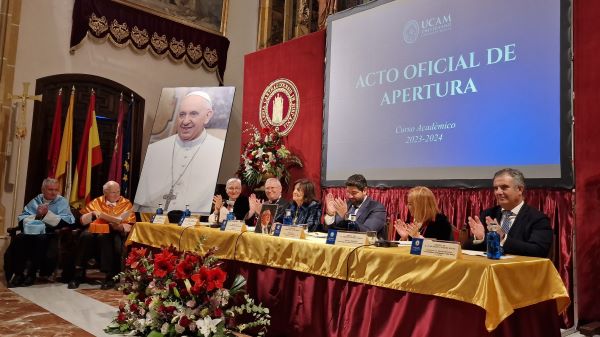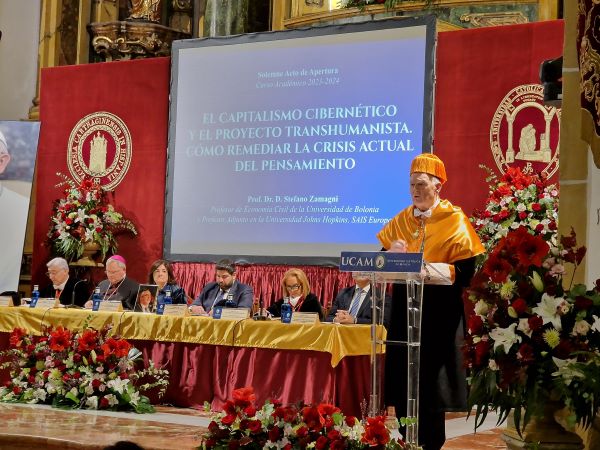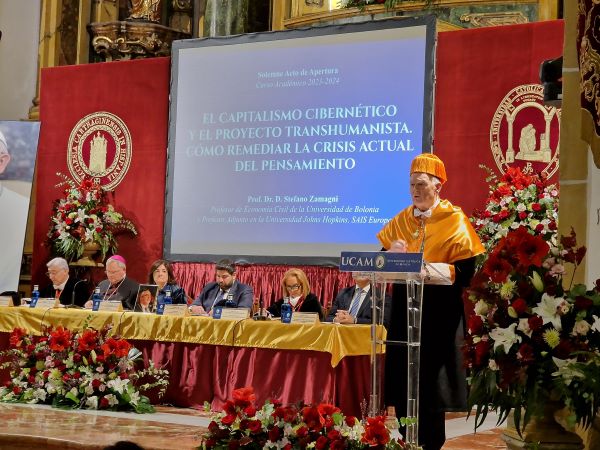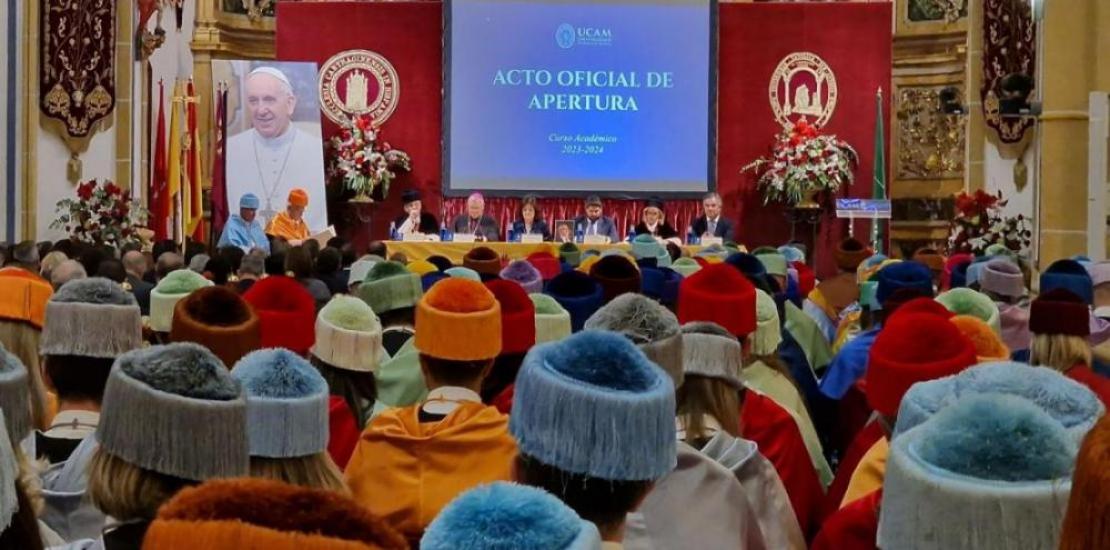‘José Luis left a large void in all of us; especially in me’
María Dolores García, UCAM president, kept the founder of the Universidad Católica de Murcia very much in mind in her speech at the Solemn Opening Ceremony of the Academic Year 2023-2024, in which the number of students has exceeded 23,000. The Eucharist was officiated by the Bishop of Cartagena, José Manuel Lorca, and the Opening Lecture was given by the expert in Civil Economy, Stefano Zamagni
‘Good morning and welcome to this Solemn Academic Ceremony, which we are celebrating in this beautiful baroque temple of San Pedro de la Ñora, in the Monastery of Los Jerónimos; the UCAM headquarters.’ María Dolores García Mascarell, UCAM president, began her speech today with these words, just as her husband and founder of the University, José Luis Mendoza, had done for the previous 26 years.
The day began with the celebration of the Eucharist, presided over by José Manuel Lorca Planes, Bishop of the Diocese of Cartagena. This was followed by the Academic Ceremony, presided over by María Dolores García Mascarell, joined by Josefina García Lozano, Rector of the institution; Fernando López Miras, President of the Autonomous Community of the Region of Murcia; Juan María Vázquez, Regional Minister for the Environment, Universities, Research and the Mar Menor; Antonio Montoro, Honorary Rector and José Manuel Lorca Planes. Stefano Zamagni, Civil Economics lecturer at the University of Bologna and Adjunct Professor at Johns Hopkins University (SAIS Europe) delivered the Opening Lecture.

María Dolores García, in her first Opening Ceremony as UCAM president, recalled the principles of the institution, ‘committed to training new generations; not only to achieve great professionals, but also to convey the values which emanate from Christian Humanism to young people and to facilitate their reunion with Christ.’
During her speech, she highlighted the quality of teaching as one of the priorities of the university, which has 34 verified Bachelor's Degrees and 42 official Master's Degree programmes, integrated into 11 faculties. The University has participated in all the processes promoted by ANECA, resulting in the renewal of the accreditation of all the degrees presented in the 22/23 academic year and ‘the positive assessment of its Model for the Evaluation of the Teaching Staff’s Teaching Activity Quality, thanks to the DOCENTIA programme,’ which was highlighted in the speech. She also recalled other fundamental aspects of the institution, such as its involvement in social work or its support for sports, entrepreneurship and research, with an investment over the years of over 200 million euros, more than 50% in the last five years.
The UCAM Rector, Josefina García, thanked the more than 23,000 students who this year entrusted UCAM with their ‘high-quality’ training which includes both their ‘professional skills and humanism’. She reminded them that, in this institution, the student is at the very centre, pointing out that ‘the University has visions, some of which were set out by our president’. Moreover, she stated that UCAM held this event ‘with great sorrow because of the absence of José Luis Mendoza, whom we feel present every day’ and who ‘was generous in appointing María Dolores García Mascarell to lead the way.’ During her speech, she reproached the Autonomous Community authorities because the institution has still not received the distinction of being an Entity of Public Interest, which prevents it from starting work on its campus land; ‘we keep acquiring buildings, we keep building, but our premises are still at a standstill.’

For his part, Fernando López Miras, President of the Region of Murcia, also remembered the UCAM founder, ‘who left an unquestionable humanist legacy in the Region and in Spain, and who devoted part of his life to making his Region better thanks to this institution.’ After describing UCAM as a benchmark for knowledge at regional, national and international level, he highlighted the fact that over 100,000 students have studied in its classrooms, and acknowledged its commitment to sports and entrepreneurship; ‘its work is in favour of progress.’ In addition, López Miras declared that his government will create a new Regional Law on Universities, agreed with all of them, which responds to the needs of the current university system, and aimed at boosting it ‘with more talent, more entrepreneurship, more research and more innovation.’
José Manuel Lorca Planes, bishop of the Diocese of Cartagena, referred to the relationship between faith and reason; two aspects which ‘need each other’, and recalled the impetus of José Luis Mendoza to create ‘an evangelising university.’ He also pointed out that young people are in a great moment of their lives: ‘I ask the Lord that in the classrooms of this University He may help to nourish the roots of those who are here. Society demands people that are prepared, and have a big heart.’

What's the solution to the current existential crisis?
‘Life slips through our fingers. Let us make it seed instead of sand,’ said Stefano Zamagni, lecturer at the University of Bologna and adjunct professor at Johns Hopkins University (SAIS Europe) in his opening lecture, making José Luis Mendoza and his work, UCAM, an example of a transforming institution. The prestigious economist spoke about the transhumanist future, proposing neo-humanism as the solution.
‘We are experiencing a great transformation’, he said, ‘artificial intelligence does not differenciate between true and false, it only deals with the plausible, and the phenomenon of false truths arises, which is much more serious than the fake news one.’ He also warned about singularism ‘a step beyond individualism, which makes young people live as if their community did not exist, being in contact with it but without establishing a relationship. This is also the case in political life.’ He also warned that ‘transhumanists do not say, like atheists, that God does not exist; they say that He is not necessary, that He is irrelevant.’
Zamagni provided a very graphic example: ‘With automation, robots replaced workers' arms; artificial intelligence is intended to replace their minds.’ He encouraged the Social Doctrine of the Church to be kept up to date ‘in order to interpret the new developments of our time in the light of the same basic principles.’




